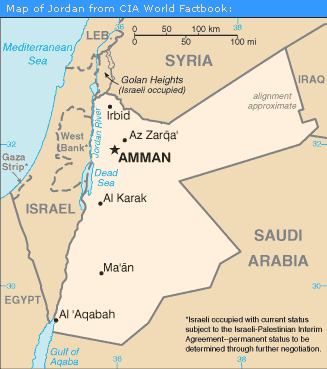Jordan is a monarchy, with a bicameral legislature. The monarch appoints members of the National Assembly, and popular elections determine the House of Representatives. By law, women must hold at least six of the 110 seats in the House of Representatives. King Abdullah Hussein ruled Jordan from 1953 until his death in 1999, and struggled to balance his generally pro-democratic sentiments against threatening political realities. For example, King Hussein lifted martial law in 1989, only to see rapid growth in Islamic parties dominated by Palestinians opposed to peace with Israel. (More than half of Jordan’s population is Palestinian. Hussein signed a peace treaty with Israel in 1994.) Abdullah II, a former commander of the Jordanian special forces who was educated in the United States, has faced similar challenges since his father’s death. Abdullah’s wife, Queen Raina, is Palestinian, a fact that has likely increased Abdullah’s popularity, especially among Palestinians. Islamists boycotted the 1997 elections, but the Islamic Action Front captured 18 seats in the 2003 elections — later questioning the lower-than-expected results. The Jordanian press faces limitations on its criticism of the king, who has expressed a desire to ease restrictions on the media and ease the government into a full constitutional monarchy.
July 19th, 2005
Future for Lebanon
Map: Middle East Governments: Jordan
- Introduction
- Afghanistan
- Bahrain
- Egypt
- Iran
- Iraq
- Israel
- Jordan
- Kuwait
- Lebanon
- Oman
- Pakistan
- Palestinian Territory
- Qatar
- Saudi Arabia
- Syria
- Turkey
- United Arab Emirates
- Yemen


